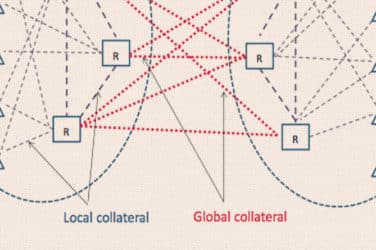As new regulations that demand higher collateral requirements speed into view—such as Dodd-Frank in the U.S. and Emir in Europe, as well as the Basel III bank capital adequacy rules—firms are desperately seeking ways to free up their precious resources.
A collateral shortfall of up to $2 trillion is predicted industry-wide once Dodd-Frank and Emir kick in as firms will be forced to substantially increase collateral requirements in the form of margin with many OTC derivatives contracts set to be pushed through centralized clearing for the first time, in a bid by regulators to cut systemic risk following the financial crisis.
One custodian bank, Citi, earlier this week announced that it is teaming up with Deutsche Börse’s Clearstream and Belgian-based Euroclear, in two separate deals, to offer tri-party collateral management solutions with the European central securities depositories giants.

Richard Glen, head of global securities financing sales for the U.K., Ireland and the Americas, Clearstream
“There are underlying infrastructure providers, agent banks and sub-custodians that hold custody portfolios for mutual clients and what Clearstream has been trying to do is to integrate its own collateral management products as part of their service offering to clients,” Richard Glen, head of global securities financing sales for the U.K., Ireland and the Americas at Clearstream, told Markets Media.
With the introduction of central counterparties in previously bilateral OTC derivatives trades adding to the complexity, firms are looking to use tri-party collateral agents, such as Clearstream and Euroclear, as a way to simplify these transactions as the new regulations descend.
“Tri-party collateral management services bring additional flexibility to the markets,” said Andrew Lamb, chief executive of CME Clearing Europe, the European clearing house of exchange operator CME Group.
Improving access to collateral is seen as key to being able to operate in this new environment. And these tie-ups between market infrastructure firms may even go some way to easing the future collateral burden.
“The issue of collateral fragmentation is obviously quite a substantial one for the industry and our initiative focuses on leveraging our technology and expertise to give clients the ability to mobilize assets efficiently across a variety of different collateral pools,” said Glen at Clearstream, who also have launched a similar tri-party collateral management arrangement with BNP Paribas Securities Services.
Citi says it will help the mutual customers of either Clearstream or Euroclear manage their collateral better with the tri-party agents working out their collateral moves—instead of the clients having to work it out themselves—with the customers’ asset portfolios continuing to remain under Citi’s custody.
“The alliances with Euroclear and Clearstream allow our mutual clients to access a larger, global pool of inventory across domestic and international markets, thereby optimizing collateral management and funding opportunities,” said Sanjiv Sawhney, EMEA head of securities and fund services at Citi.
“As a result, the assets they deposit with Citi can be considered part of the inventory of securities that can be used to fulfill collateral requirements in tri-party managed deals. This solution further demonstrates Citi’s commitment to developing an open architecture which allows our clients to access liquidity pools seamlessly and eliminate collateral fragmentation, thereby creating significant efficiency gains.
“The increased risks related to counterparty exposure as well as the new regulatory environment—Dodd-Frank, Emir and Basel III in particular—are accelerating the need for more efficient and automated collateral management solutions that reduces collateral fragmentation.”
The move is all part of a bid to simplify the process and pool collateral at a central point.
“The initiative is a significant market development, with the aim of delivering meaningful client benefits at a time when collateral is in greater demand than ever,” said Frederic Hannequart, chairman of Euroclear, which has seen its tri-party offering grow by 30% last year.
Hannequart added that Euroclear’s tie-up with Citi will “help our clients better manage counterparty exposures, ease access to liquidity and make more effective use of their assets as collateral, while alleviating the challenges of collateral fragmentation”.
The tri-party collateral management structure potentially offers solutions to a raft of collateral issues.
“Tri-party is proving extremely versatile,” said John Rivett, global business executive for collateral management at JPMorgan. “It offers an efficient solution to a whole new set of collateral management challenges, extending well beyond its historical beginnings to embrace new trends and participants, including the desire to segregate collateral with a third-party custodian.”
Clearstream say its system mobilizes collateral in real time and only up to the amount that is required instead of moving collateral back and forth at the beginning and end of the day.
“We’ve also tried to be intelligent about the timing of any collateral movements that may need to take place,” said Glen at Clearstream.
“Optimization is key and we have developed a real-time collateral management system where we monitor collateral positions and movements in real time, intra-day, across all eligible locations and only mobilize assets when needed. This allows clients to balance both their international and domestic financing needs accordingly.”





